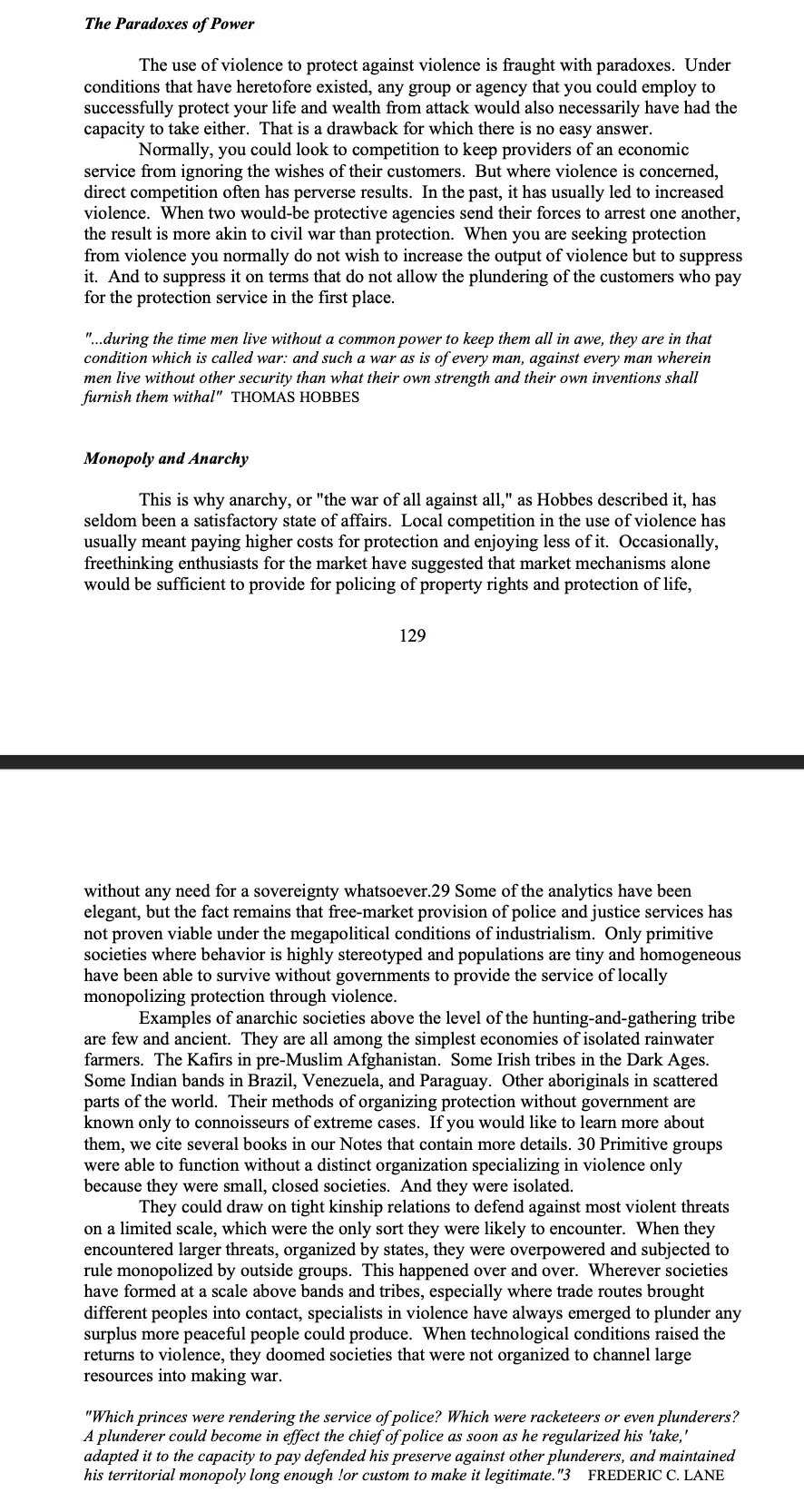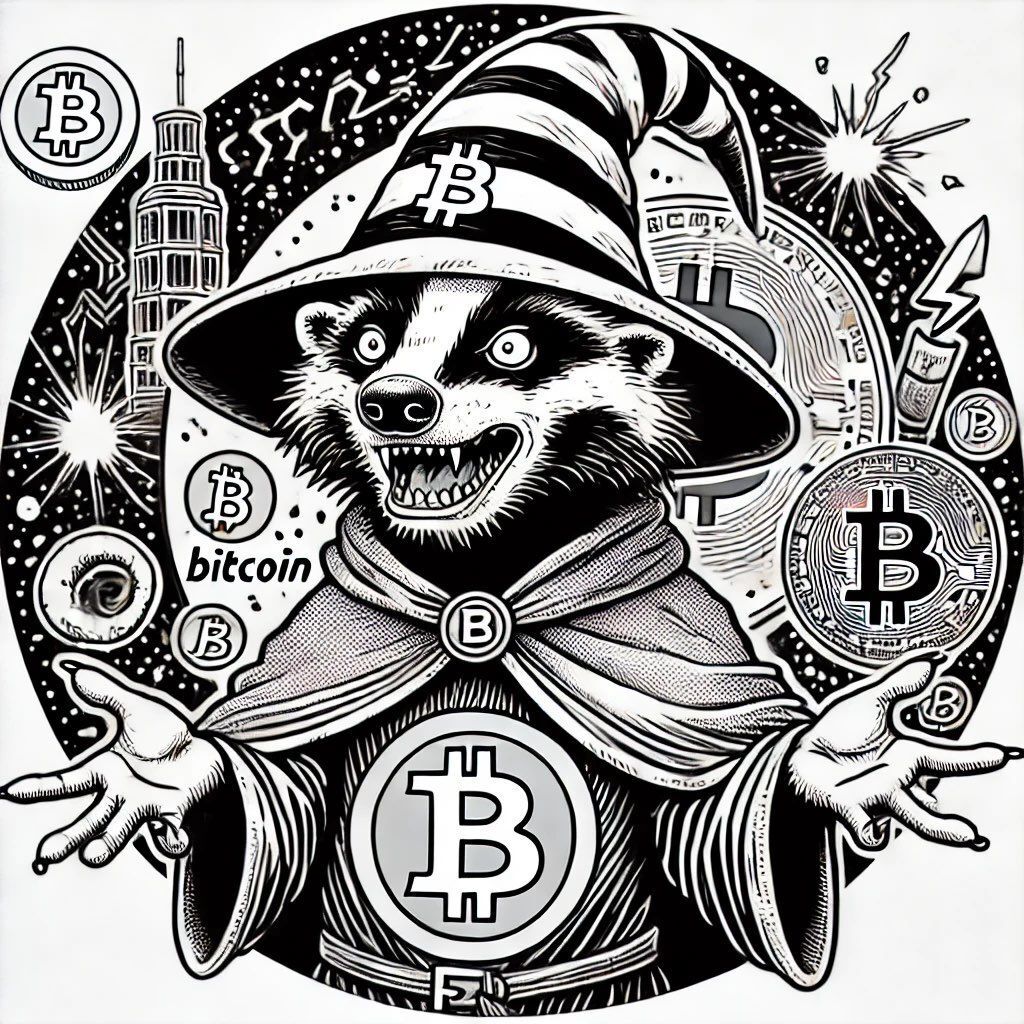Original article found here: https://medium.com/@chrisguida/why-anarcho-capitalism-and-sovereignty-maximalism-are-incompatible-eeb831c03323 THIS IS WORK DONE BY <span itemprop="mentions" itemscope itemtype="https://schema.org/Person"><a itemprop="url" href="/npub19z2uxvxz8uurr9kqa7vgmek6swurk3vra40ec8kmpf2eemx3lyqq6zfkd4" class="bg-lavender dark:prose:text-neutral-50 dark:text-neutral-50 dark:bg-garnet px-1"><span>Chris Guida</span> (<span class="italic">npub19z2…fkd4</span>)</a></span>
Let me begin by saying I have the utmost respect for Mr. Lopp’s substantial contributions to the bitcoin ecosystem, to which I am also a(n aspiring) contributor.
For context, I used to identify as an anarcho-capitalist (ancap) several years ago, so this is coming from a place of love and understanding. I always had lots of questions about some of the more outlandish claims of this ideology, but I decided officially to stop identifying with this label after reading The Sovereign Individual, a book I now consider to be much closer to the essence of my political philosophy, though I don’t align with it 100%.
Anarcho-capitalism is (among many things) the belief in a vision for the future of humanity in which there are no governments; that is to say: no monopolies on violence. There are several problems with this vision. Let’s see what the authors of The Sovereign Individual (James Dale Davidson and William Rees-Mogg) have to say on the topic:
 The Sovereign Individual (by James Dale Davidson and William Rees-Mogg, published in 1997 by Simon & Schuster) argues against the idea of competition by protection services within the same geographical area
The Sovereign Individual (by James Dale Davidson and William Rees-Mogg, published in 1997 by Simon & Schuster) argues against the idea of competition by protection services within the same geographical area
The thrust of this argument is that, in most situations, a monopoly on violence lowers the cost of protection below what it would be if there were competition among protection services (that is to say: turf battles). This is, in fact, precisely the reason why we rarely see anarchic societies in practice — in the free market, monopolies on violence dominate other forms of meatspace governance. (As a side note: mostly everyone, including ancaps and the authors of The Sovereign Individual, appears to deny that, at the highest level, the world lacks a monopoly on violence, and this is why we see constant proxy wars between superpowers and would-be superpowers, a situation that leads to much destruction of property and human life.)
Even ancaps themselves believe in monopolies on the use of force on a small enough scale. If you suggest to an ancap that someone else should be able to come into their house and commit acts of violence, you will hear loud protestations that a man is sovereign in his own home and that no one but he is allowed to use force within the boundaries of his home. When you point out that this situation constitutes a monopoly on violence and that his home is the jurisdiction, you will be met either with hostility, profound cognitive dissonance (“yes, other people can commit violence in my house”), or simply blank stares.
The way out of this paradox is to simply admit that some monopolies on violence are efficient, adaptive, and desirable (obviously others are not). Most ancaps would probably agree with the notion that decentralizing violent power is desirable wherever possible. Thus: power over yourself and in your own home are good, homeowners’ associations are less good, municipal governments and police forces are worse than that, state governments and highway patrol are terrible, nation states and militaries are horrifying, and global government is evil incarnate. The authors of The Sovereign Individual predict a future where nation states collapse under their own weight, and power is transferred to the regional and municipal level, as (they argue) a system of city states will be much more adaptive to the ascendant Information Age than the current nation-state system. I agree with this conclusion, and also with the book’s assertion that extranational money (i.e. bitcoin) will bring this new reality into existence.
I’m not sure what Mr. Lopp means when he says he’s a “sovereignty maximalist”, but one thing is clear to me: anarcho-capitalism is not “sovereignty maximalism”. Why? Because ancaps are only in favor of individual sovereignty, insofar as they support sovereignty at all. In practice, when you actually go and hang out with ancaps, the vast majority of them don’t adhere to any sort of concept of sovereignty. Mostly when they get together, they complain about how much harm large governments are causing in their lives, rarely admitting their own responsibility in these matters. In other words: ancaps may talk a big game, but they generally fit more into the category of “nation-state sovereignty-” or “global-government sovereignty-” minimalists, rather than “sovereignty maximalists”.
Let’s step back for a moment to discuss what “sovereignty” means. The word “sovereign” originally comes from the word for “king” (and still sometimes carries this denotation). I like what this implies for our purposes, which is that “sovereignty maximalism” is the same as “king maximalism”. But what is a king? A king is anyone who has the final say over a particular set of policies, an institution, or a territorial jurisdiction. Anarcho-capitalists, as far as I can tell, believe in only individual sovereignty, or no sovereignty at all. The “individual sovereignty maximalists” are those individuals who possess an internal locus of control and thus take full responsibility over at least themselves and their own lives.
The “sovereignty minimalists” are those who take the opposite view; their external locus of control leads them to spend most of their time worrying and complaining, and none of their time fixing things or building new things. (I am confident Mr. Lopp does not fall into this category). I call these people “sovereignty minimalists” because their belief system appears to deny the desirability or even the existence of any kind of sovereignty or agency at all; they always look to external forces when they ascribe responsibility, and insofar as such external forces have sovereignty, they are evil.
This has been a perennial problem for anarchists. How can anarchic societies defend themselves against an external sovereign? Spoiler alert: they can’t. Such societies are inevitably conquered by external forces, as a house divided against itself cannot stand. Take any historical example of a completely anarchic society, and I will show you a society that could not defend itself, eventually succumbing to external invaders (or simply collapsing or dissipating from internal differences).
Statist societies, of course, also tend to share this fate, because they usually reach a point where they lack internal coherence, which exposes them to divisive forces, both internally and externally. But these societies tend to be much more plentiful, sustainable, and prosperous, than anarchic ones. Ireland’s indigenous Brehon system, which lasted for several centuries before being conquered by the British, was a notable exception. (The Sovereign Individual would probably argue that the existence of this society was an artifact of the “megapolitical age” in which it existed, where defense was much cheaper than offense.)
I’ve been deliberately blurring the lines between individual sovereignty and collective sovereignty because they are both important, relevant, and interdependent concepts. An individual sovereign is best served by supporting a collective sovereign that affords his quest to further his own individual sovereignty. The collective sovereign, if benevolent and wise, can bring down the costs of maintaining sovereignty in one’s own life, making it easier to build wealth, conduct commerce, and care for others.
Another word for “sovereignty” is “agency”. When an individual or collective sovereign loses agency, that is akin to mental illness, both on the individual scale and the collective scale. When an individual loses agency, such a loss is usually a sign of senescence, and signals that death may be near. It means that the individual’s identity is becoming incoherent, either psychologically or physically (usually both). When an institution or society loses agency, the prognosis is similar, but on a collective level rather than individual.
I would love to go on for hours on this topic, and how I think bitcoin fits into it, and how sovereignty at different scales affects that at other scales, and which kinds of sovereignty are desirable - but I think the preceding discussion is probably sufficient for now.
I hope this can start a dialog in the bitcoin community about eventually shedding the “anarcho-capitalist” label, or else reforming the anarcho-capitalist movement to acknowledge that individual sovereignty is a form of monopoly on violence, that such monopolies are not necessarily maladaptive, and that the smaller the scale at which they occur, the more desirable such monopolies are.

